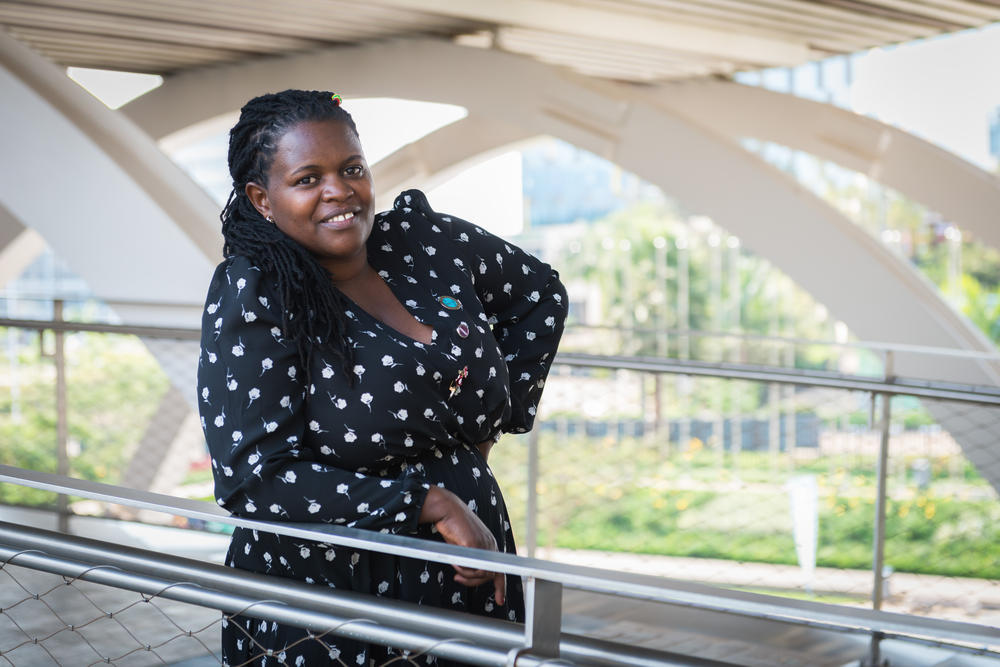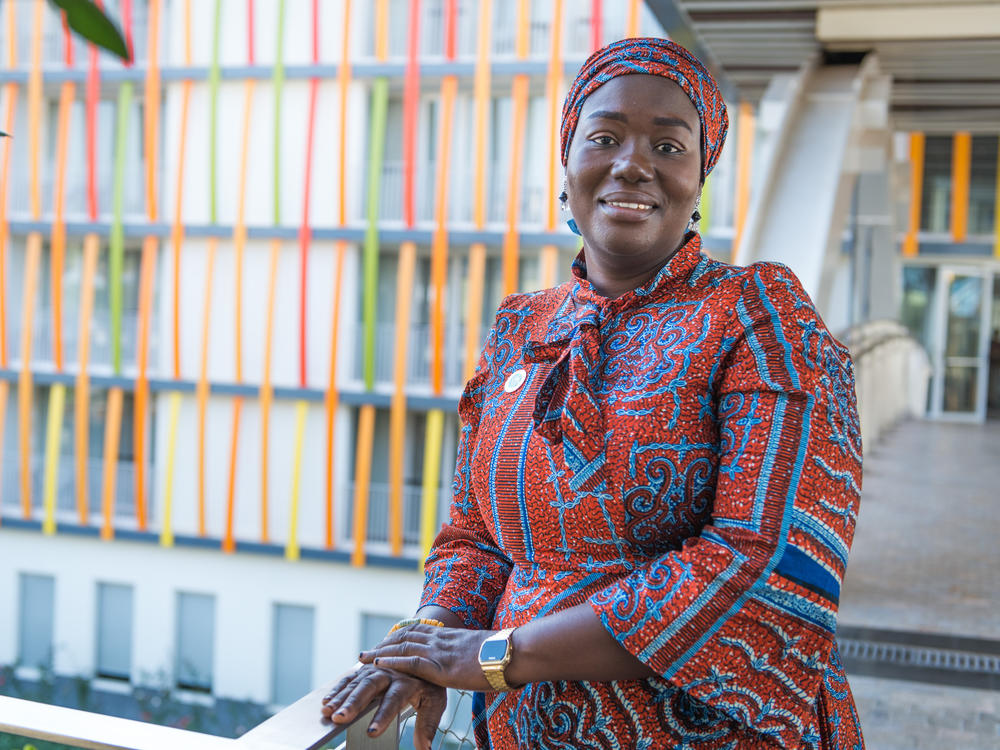Section Branding
Header Content
What does it take to be a heroine of health? Education, dedication ... a stealth plan
Primary Content
Prossy Muyingo is being honored as a "heroine of health" for helping women make more informed choices about family planning and reproductive health. She says she couldn't have done it without hair braiding.
Muyingo is one of twelve women honored with that title at the Women Deliver 2023 Conference, an annual international event that focuses on gender equality and the health, rights and well-being of girls and women. A 37-year-old mother of three who lives in Kampala, Uganda, she's a community health worker who goes door-to-door to educate women about their sexual health and reproductive rights.
But women in the low-income communities she serves often can't afford the time to chat with a health worker who shows up at their doorstep, says Muyingo: "I could be out on the field for six hours but still not be able to get to speak to women in detail about their health concerns."
Hair is her stealth ally
So she came up with a plan that drew upon a different set of skills.
Before the pandemic, Muyingo ran a hair salon to supplement her income. Although she's paid for her community health work by Living Goods, a health-care charity that works with the government, it's not enough to get by.
"I would tell them about my salon and invite them over for hair-braiding sessions," she says. "That often excited them. And once they arrived, I can get up to two hours with them while plaiting their hair." She'd charge for the appointment but the women get more than a new look. As she braids, Muyingo asks about their medical history, talks about their sexual health – including the use of contraception — and directs them to appropriate clinics for reproductive or other health-care issues.
"For example, once I was plaiting the hair of this lady, Mama Shamila, who had three children under five years. She was only 22 years old. So I broached the topic of family planning with her. I told her I also had three children but I am much older and explained the benefits of family planning," Muyingo says.
"She was curious how I did it, so I explained the use of contraceptives. She had many questions about whether it is safe but then mentioned her husband wouldn't be comfortable using them." Muyingo advised her to start by coming on her own to a health center that offers family planning services. In countries where patriarchal norms dictate women's decisions, health specialists may suggest that a woman come without her partner to preliminary checkups.
Like Muyingo, all of this year's honorees are from Africa. With the awards event being held in Africa for the first time, the idea was to pay tribute to "the contribution of women health workers in Africa in advancing sexual and reproductive health and rights." The honorees include doctors, nurses, midwives and health-care workers.
It's a critical time to recognize the role of women in health care, says Dr. Roopa Dhatt, co-founder and executive director of Women in Global Health, which runs the award program. "The world has grappled with the rollback on sexual and reproductive health and rights as well as recurring humanitarian crises," she notes. She also stresses the importance of women in health care: "Women represent nearly 70% of the health and care workforce and are 90% of frontline health workers. Despite their commitment, women continue to be clustered into lower status jobs, lower paid and unpaid, frequently in unsafe working conditions subject to violence and sexual harassment and marginalized in decision-making."
At the conference, NPR interviewed two of the honorees, who discussed their own struggles for more recognition and better treatment by the medical establishment: Muyingo and Rukaya Mumuni, a 37-year-old nurse and public health official from Ghana.
Inspired by a nurse from her village
Mumuni comes from a poor rural community in Ghana with few educational opportunities. "Most of the girls from my village in Gugshigu district would drop out of school to move to the big cities to look for jobs. I also grew up with a lot of difficulties," she says. "My mum was a single parent, I never met my father."
"Most of the nurses who served our community came from the outside, since many girls never got educated. But one day, when I went to the hospital with my mum, I met a female nurse who was from our village," Mumuni says. That encounter inspired her to pursue nursing and later a Master's degree in public health.
Women in Ghana face daunting challenges in the field of health care, says Mumuni. "We receive very low salaries and incentives [as compared to men]. In fact, if you are not in a higher pay grade, you are not entitled to transportation allowance," she says. Women who travel in their work as community nurses "often pay out of their own pocket."
Yet without these women, she says, the health care system would suffer. For example, the hospital where she works has a cervical cancer screening center that serves a population of 300,000 women. When the only person there who could run the equipment left the center, Mumuni pushed to train female nurses to take over rather than allow the center to close. She says she faced an uphill battle before getting a commitment from the authorities.
It's an example, Mumuni says, of how women are often undervalued in health-care settings.
"Even though the majority of the health-care system [workers] are women, men take up most of the credit — because they are large, tough. I wish women [could] get the right training, compensation, mentorship and recognition for the vital work they do in health care," she says.
"Still I see so many nurses working with utmost dedication, they are so passionate about their work. And that is why I am here, — to receive this award for them," she says.
When she sent a photo of the award to her female colleagues, she says, "I told them it was their victory." They texted her that they were so happy, they cried.
And just as she was inspired to pursue nursing after meeting a female nurse, she says other young women have taken inspiration from her example.
"Lots of young women tell me they want to follow my steps. I am very active on social media. When I post my picture, I get comments from young girls from my village, They say they get so happy to see my work and success, and they are motivated to be like me."
Mumuni says she does what she can to make give these girls a chance. "This one young girl came to me seeking domestic work; she had dropped out of primary school to support her family. I made sure she was back in school and I try to support her in any way I can because education is so important. When I look at myself, I can see how far education has brought me. I am hopeful it can do the same for her."
A call for better pay
Advocacy for the rights of community health-care workers is central to Muyingo's work in Uganda. "We don many hats [as health-care workers]; we are researchers when we are seeking out important information, we are a support system to our communities, helping them get medical care and follow up on their treatments and vaccinations. But for all this we need to be salaried," she says, noting that in Uganda community health workers typically get a small cash stipend that isn't sufficient to support a family.
Muyingo herself has struggled to get by. During the pandemic, she had to permanently close her hair salon. While she continues to operate a smaller hairstyling business from her home, life hasn't been easy. "The pandemic was a very difficult period for me as a health-care worker and a mother. It highlighted that we have a lot of gaps in the community. For instance, we couldn't even secure [personal protective equipment] for our work even though we were on the front line of serving our community," she says.
Muyingo was drawn to community health care after dealing with the bureaucracy in Uganda to secure health care for her son, who was diagnosed with sickle cell anemia.
"My 13-year-old son is suffering a lot and needs [treatment at a hospital] every Monday, but the hospitals were very difficult to navigate. Even getting simple information on the services was hard," she recalls.
Today, she campaigns not just for better pay for community health workers but for training and technological resources to help them gather and report information to the authorities.
She hopes that the information she shares will help others. She recalls a 21-year-old she met who was one month pregnant. Muyingo directed the young woman to a clinic for prenatal care, where the pregnant woman learned she was HIV positive. "She panicked and left without seeking help," says Muyingo. "I went to her house for follow-up and convinced her to get medical help so that her baby can be safe." The woman took drugs to reduce the risk of infection for the fetus. "Today her child is 2 years old, and he is HIV negative."
"Being a community health worker is a call from God," Muyingo says, reflecting on her work. "You are not there to become rich but to help lives. The feeling you get when you know that no child in your community is going to get polio or measles because of your efforts, that feeling is very satisfying."
Ruchi Kumar is a journalist who reports on conflict, politics, development and culture in India and Afghanistan. She tweets at @RuchiKumar
Copyright 2023 NPR. To see more, visit https://www.npr.org.



